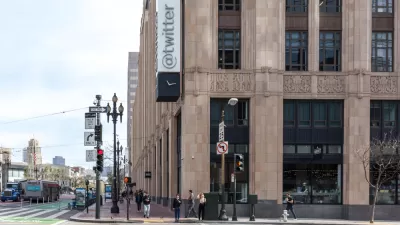AZUL: 12PM-3PM@The Brig - Abbot Kinney and Palm in Venice; 6PM-9PM@La Brea/Pico Billboard Eco Art - 4829 West Pico just east of La Brea
AZUL: 12PM-3PM@The Brig - Abbot Kinney and Palm in
Venice;
6PM-9PM@La Brea/Pico Billboard Eco Art - 4829
West Pico just east of La Brea
If the above is Greek to you, you're looking at a Twitter update from the Kogi BBQ Truck, a Korean BBQ taco truck (yes, Korea-style tacos) that has become instantly as ubiquitous to Los Angeles as police helicopters and chihuahuas. Kogi hit on the formula that has changed the entire business model of the food truck: by posting regular updates on Twitter, devoted fans know when and where to come swarming in. As opposed to the Mexican taco truck model, which is to stake out a corner semi-permanently and hope people find you, the Kogi truck is truly mobile because people only have to look online to know exactly where it is at any given moment.

Kogi now has 36,000 followers (some of which you can see waiting over an hour in the photo above). And while some of the attention on Kogi is clearly a fad, the fun and accessibility of the Twitter/taco truck combo have created a boom in mobile eating.
Planetizen's offices seem to be at Ground Central of the truck craze, with 5 trucks and counting stopping by on a regular basis. Bool BBQ (a clear copy of Kogi, but delicious nonetheless), The Green Truck (organic food), a true taco truck, King Kone (ice cream), and the Sprinkles truck (decadent cupcakes). Today I even saw an old-school hot dog stand on the Miracle Mile.

So what is the impact of this mobile food phenomenon? As Nate Berg observed last week, it is in many ways an expression of the informal economy. On the down side, permanent restaurants nearby face competition they didn't count on. The nearby Organic-To-Go restaurant is none too happy about The Green Truck, even reportedly resorting to calling the cops. In that respect, the mobile business subverts careful planning and adds a touch of chaos that the shaky world of retail doesn't need right now. But maybe the trucks just create a greater sense of destination to an area and all businesses win. As William H. Whyte observed, "Food attracts people who attract other people."
Another advantage is that the mobility of the trucks means that public spaces become flexible.Trucks can drive in and sell their wares during the lunch rush, then clear out just as kids are coming to the park to play. They can arrive at events and feed people as they wait in line, and even respond to reported crowds that gather spontaneously.
To me, the real story is the combination of mobility and instant notification that these trucks represent. It's very enterprising and American, and it exploits social media in all the right ways. What if everything you needed to do was mobile? What if the DMV truck made the rounds of the city, and you could step outside and take care of your expired registration without hauling yourself over to the bad part of town? What about dry cleaning? What would a Mobile City look like?

Planetizen Federal Action Tracker
A weekly monitor of how Trump’s orders and actions are impacting planners and planning in America.

Maui's Vacation Rental Debate Turns Ugly
Verbal attacks, misinformation campaigns and fistfights plague a high-stakes debate to convert thousands of vacation rentals into long-term housing.

San Francisco Suspends Traffic Calming Amidst Record Deaths
Citing “a challenging fiscal landscape,” the city will cease the program on the heels of 42 traffic deaths, including 24 pedestrians.

Amtrak Rolls Out New Orleans to Alabama “Mardi Gras” Train
The new service will operate morning and evening departures between Mobile and New Orleans.

The Subversive Car-Free Guide to Trump's Great American Road Trip
Car-free ways to access Chicagoland’s best tourist attractions.

San Antonio and Austin are Fusing Into one Massive Megaregion
The region spanning the two central Texas cities is growing fast, posing challenges for local infrastructure and water supplies.
Urban Design for Planners 1: Software Tools
This six-course series explores essential urban design concepts using open source software and equips planners with the tools they need to participate fully in the urban design process.
Planning for Universal Design
Learn the tools for implementing Universal Design in planning regulations.
Heyer Gruel & Associates PA
JM Goldson LLC
Custer County Colorado
City of Camden Redevelopment Agency
City of Astoria
Transportation Research & Education Center (TREC) at Portland State University
Jefferson Parish Government
Camden Redevelopment Agency
City of Claremont






























